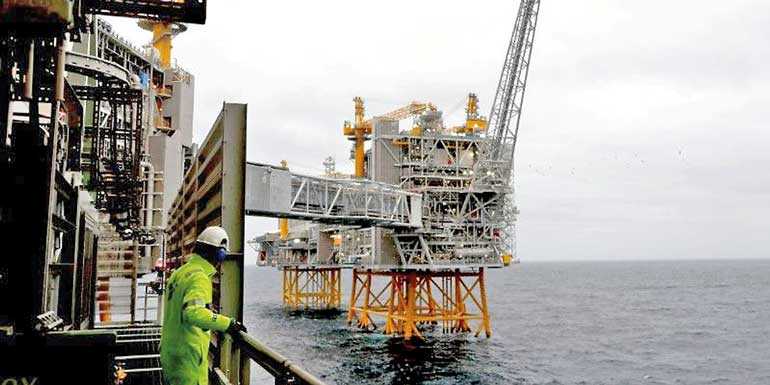Tuesday Feb 17, 2026
Tuesday Feb 17, 2026
Wednesday, 22 January 2020 00:01 - - {{hitsCtrl.values.hits}}

FILE PHOTO: A general view of the Johan Sverdrup oilfield platforms in the North Sea
SINGAPORE (Reuters): Oil prices eased on Tuesday as investors appeared to shrug off earlier supply concerns following a force majeure declared by Libya on two major oilfields amid a military blockade.
Brent crude was trading down 30 cents, or 0.5%, at $ 64.90 per barrel by 0318 GMT, after rising to their highest in more than a week on Monday. US West Texas Intermediate crude futures were down 14 cents, or 0.2%, at $ 58.40 a barrel.
“Every time we get a big geopolitical event, the market spikes up but everybody looks at that as a chance of a selling opportunity,” said Tony Nunan, oil risk manager at Mitsubishi Corp in Tokyo.
Two major oilfields in southwest Libya began shutting down on Sunday after a pipeline was closed off, potentially reducing national output to a fraction of its normal level, the country’s National Oil Corp (NOC) said.
A document sent to oil traders and seen by Reuters on Monday said the NOC had declared force majeure – a waiver on contractual obligations – on crude loadings from El Sharara and El Feel oilfields in Libya’s southwest.
If Libyan exports are halted for any sustained period, storage tanks will fill within days and production will slow to 72,000 barrels per day (bpd), an NOC spokesman said. Libya has been producing around 1.2 million bpd recently.
Anti-government unrest in Iraq, another major oil producer, also had initially supported oil prices, but officials later said production in southern oilfields has not been affected by the unrest.
Any supply disruptions could be offset by increased output from the Organization of the Petroleum Exporting Countries (OPEC), which could limit the impact on global oil markets, the head of Japan’s petroleum industry body said.
“We are caught in this ($ 65 per barrel) trading range,” Nunan said. “Anything below and OPEC is going to have a tough time balancing their budgets ... and anything above, shale (output) will rebound.” Another factor reassuring the market is OPEC spare capacity, which stands in excess of 3 million bpd, of which the bulk sits in Saudi Arabia, analysts from ING Economics said in a note.
Adding to supply, Guyana exported its first-ever shipment of crude on Monday, marking the tiny South American nation’s debut as an oil exporter.
Meanwhile, Bank of America Global Research raised its 2020 oil price forecasts on Monday, citing risks to supply from the Middle East, an improving demand outlook and higher OPEC+ compliance to deepen output cuts.